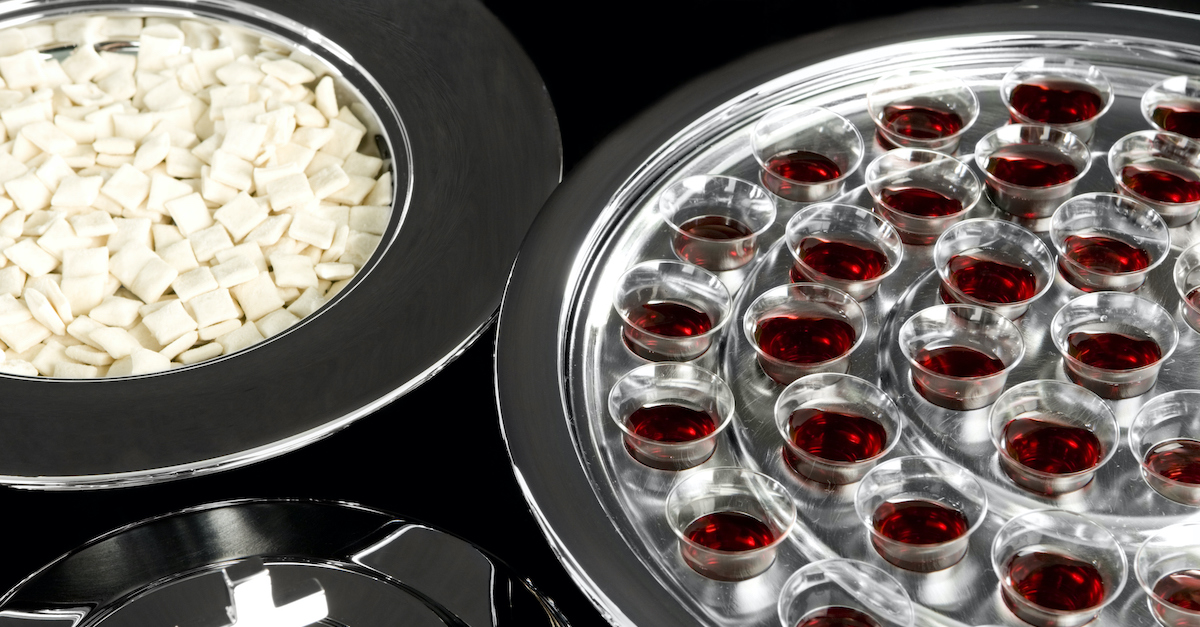Who Can Take Communion?
Share

One of the sacraments of the church is communion. In short, communion is a remembrance of the celebration of Christ that is reserved for those who belong to him.
The frequency and the way communion is served varies from church to church. Some churches make communion a part of every service, while some do it the first Sunday of every month. There are even churches that only serve communion on occasion with no set schedule. I used to go to a church that had no schedule of when they would serve communion. You would just show up to church and discover communion was being served that day. Because they had no schedule, sometimes they would announce it ahead of time in case people wanted to partake.
While having no set schedule for communion may be foreign to you, especially if your church does it on a schedule, there really are no rules as to how often communion should be served in church. While there may not be rules for when to serve communion, there are some guidelines as to who can take communion. In many churches they don’t spend a lot of time explaining these things. Therefore it is possible you may not know, so let’s change that.
What Is Communion?
Communion, which can also be known as the Eucharist or The Lord’s Supper, is a time when we come together to commemorate the death of Jesus for our sins. To celebrate this, we will take a bread element – in today’s church it is usually some type of cracker – and a wine element, which is usually grape juice, though some denominations use wine. Collectively as one body, we eat and drink together while remembering the sacrifice Jesus made on the cross for us. We use these elements because Jesus used them in what is known as the Last Supper.
“While they were eating, Jesus took bread, and when he had given thanks, he broke it and gave it to his disciples, saying, ‘Take and eat; this is my body.’ Then he took a cup, and when he had given thanks, he gave it to them, saying, ‘Drink from it, all of you. This is my blood of the covenant, which is poured out for many for the forgiveness of sins. I tell you, I will not drink from this fruit of the vine from now on until that day when I drink it new with you in my Father’s kingdom’” (Matthew 26:26-29).
When you take communion, the elements you are taking represent the broken body and spilled blood of Jesus.
Why Do We Take Communion?
The main reason we take communion is to remember the sacrifice that Jesus made for us. This is what Jesus said in Luke.
“And he took bread, gave thanks and broke it, and gave it to them, saying, ‘This is my body given for you; do this in remembrance of me’” (Luke 22:19).
Every time communion is being served, it should immediately become a time of reflection and remembrance.
What many people don’t realize is communion can be taken as often as you like. You could take communion everyday if you wanted to because it does not always have to be done in a church setting. Most people don’t do this, but you could have communion in your home. There is nowhere in Scripture that says communion must be administered by a pastor or priest.

Photo credit: ©Getty Images/JeffXD
Who Can Take Communion?
There are some differences among denominations as to who can take communion. Some make it open to anyone who is in the church, so if you happen to be in the building that day and they serve communion they would serve you.
If this happens, I don’t believe this is the fault of the person taking it, I believe it is the church’s responsibility to give better teaching on who can take communion. Some other denominations will require you to be a member of the church in good standing, and others may say that you should be baptized before you take communion.
Whenever you have these types of differences, the best thing to do is find your instructions from what God has said in his word. The primary teaching on communion is found in the book of 1 Corinthians 11:17-34, which we will use as our guide to determine who can take communion.
1. Communion Is for Believers
The whole point of taking communion is to celebrate and remember Jesus’ death on the cross for our sins. This celebration is designed for those who will recognize that death and celebrate what he has done for us. Typically, a person who has not given their life to Christ will find no reason to celebrate or even acknowledge what Jesus has done. This should exclude them from taking communion, but as I said earlier because churches don’t teach often on this, somehow it may not.
2. Communion Is for Those Who Are Willing to Repent
Part of the communion process is a time of reflection.
“Everyone ought to examine themselves before they eat of the bread and drink from the cup” (1 Corinthians 11:28).
Communion is a time for remembrance, reflection, and repentance. That is why it is important to examine what is in your heart. If there is sin in your heart, it is important to repent before you partake in communion. If you are unwilling to repent, then you should refrain from taking communion. Some churches will allow time for people to quiet their hearts and spend time reflecting and praying before they take the communion. I can’t say all churches do this, but I believe when you do you help people recognize the importance of the moment.
3. Communion Is for Those Who Will Recognize the Body and Blood of Jesus
For the person who takes communion, perhaps the most important aspect is recognizing what it stands for. Consider the instruction that Paul gave.
“So then, whoever eats the bread or drinks the cup of the Lord in an unworthy manner will be guilty of sinning against the body and blood of the Lord” (1 Corinthians 11:27).
“For those who eat and drink without discerning the body of Christ eat and drink judgment on themselves. That is why many among you are weak and sick, and a number of you have fallen asleep” (1 Corinthians 11:29-30).
It is so important that you recognize what the elements stand for. That’s why only those who truly know Jesus and can recognize and remember his sacrifice are the ones who can take communion – and are the only ones who should. As Paul mentioned to the Corinthian church, failure to do so was not only foolish, but led some people to experience judgement which included sickness and even death. That’s why we should make sure everyone knows what they are doing before they partake in communion.
Is It Ok for Christians to "Abstain" from Communion?
There is no Scripture that says you must take communion, but as a Christian when you recognize what it represents, then you should want to. The elements represent the price Jesus paid for your redemption and taking communion is not only a reminder of that, it is a celebration of that.
I would add this: If you are living in willful, unrepentant sin as a Christian then you should abstain from taking communion. Think of it in this light – how can you take elements that represent Jesus’ sacrifice for sin when you are choosing to willingly live in those same sins? This is the only reason a Christian should abstain from taking communion.
Look Forward to Communion in Heaven
I want to leave you with a thought. We don’t often think about this, but taking communion now is a precursor to heaven because there will be at least one communion celebration in heaven. Remember Jesus told his disciples this.
“I tell you, I will not drink from this fruit of the vine from now on until that day when I drink it new with you in my Father’s kingdom” (Matthew 26:29).
I don’t know how often we will take communion in heaven. If it will be one final celebration or if we will do it from time to time as an eternal reminder of the sacrifice that gave us the right to enter the kingdom of heaven. What I do know is that the ones who can take communion then are the ones who should be taking communion now.
Communion is reserved for those who belong to Jesus. If you are his, then the next time you take communion, whether in your church or in your home, remember what you are truly celebrating, and also know that doing this now is preparation for when we get to heaven.
Related articles
What Is Communion and Why Is it Celebrated Differently?
3 Things You Didn't Know Communion Did for Your Spiritual Life
Was There Power in Jesus' Physical Blood?
Photo credit: Unsplash/Debby Hudson

He is the author of The Pursuit of Purpose, which helps readers understand how God leads them into his will, and the author of The Pursuit of Victory: How To Conquer Your Greatest Challenges and Win In Your Christian Life. Clarence is also committed to helping 10,000 people learn how to study the Bible and has released his first course, Bible Study Basics, to achieve that goal. To learn more about his ministry and resources, please visit clarencehaynes.com.